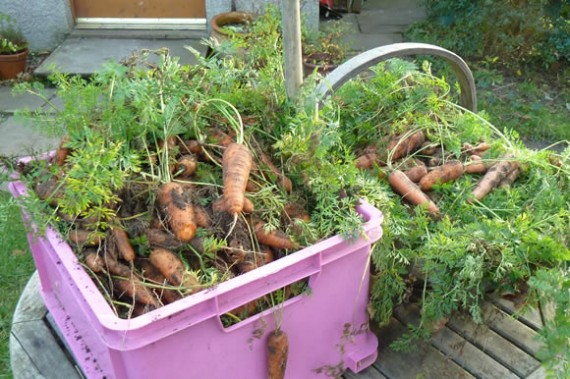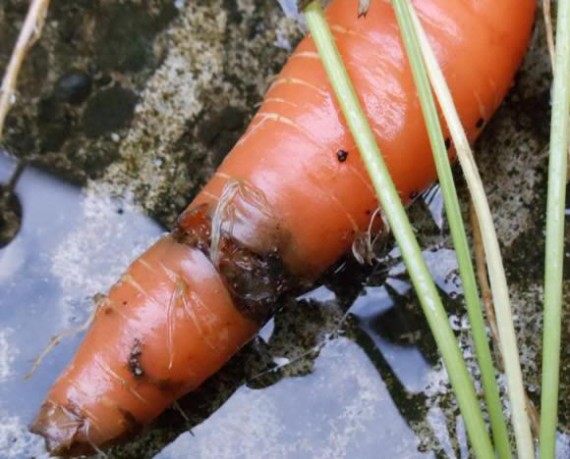Carrot problems
Carrot root fly is probably the main problem but can be dealt with, aphids are the other commons pest. Forked roots and split roots are soil management issues. Some carrots develop green tops – these (unlike potatoes) aren’t poisonous but they are unsightly and can be avoided by keeping the roots earthed up.
 Carrots are relatively easy to grow and manage and are effected by few problems.
Carrots are relatively easy to grow and manage and are effected by few problems.
With a little care you'll enjoy bumper crops.
Carrot fly
Carrot fly is a common problem for carrot growers. It's a small black fly attracted to the scent of carrots. The carrot fly lays its eggs in the soil around carrot seedlings, and when they hatch the larvae feed on the carrots, tunneling into the developing roots causing them to rot.
 Carrot fly damage. Photo: Modern Victory Garden
Carrot fly damage. Photo: Modern Victory Garden
Prevention is better than cure - once you have carrot root fly in your area you cannot eradicate it.
To prevent carrot fly:
- Sow thinly so you have fewer seedlings to remove, and thin very carefully, avoiding crushing the foliage. Thinning and weeding are the activites that will attract carrot fly most.
- Surround your carrot beds with a barrier at least 18" (45cm) high - this could be solid or a fine mesh or net. The female carrot flies won't fly above this level.
- Cover your carrot bed with fine mesh or horticultural fleece. This is what we do, and we have almost no carrot fly damage.
Aphids
Carrots aren't particularly susceptible to aphid damage, being less attractive to the pest than most other crops.
Aphids are a nuisance that can weaken and very rarely destroy your carrot crop. They suck sap from the leaves and stems and excrete honeydew, which can cause black sooty moulds to develop on the plants. In most cases aphid damage will be tolerated.
If you see aphid colonies on your carrots carefully rub them off the plants between your thumb and fingers. In most cases you won’t need to spray, but you could use pyrethrum, plant or fish oils or thiacloprid.
Forked roots
Forked roots are caused by stony soil or by insufficient thinning of the young crop. There is a view that manure can cause forking.
Forking doesn't reduce the eating quality of carrots but does make them a fiddle to clean and peel. The best remedy is to remove stones to the depth of the crop before sowing, and to thin sufficiently so that roots can establish without interference from neighbouring carrots.
- Previous « Harvesting and storing carrots

About Rosemary Champion
Rosemary lives on a 12 acre smallholding in Angus, in the east of Scotland, where she keeps Ryeland Sheep, Shetland cattle and assorted poultry. She was destined to be a smallholder from an early age.
Further Reading
 Vegetable Growing Month-by-month John Harrison |  Kitchen Garden Estate: Self-sufficiency Inspired by Country Estates of the Past Helene Gammack |  Fruit and Vegetables for Scotland: A Practical Guide and History Kenneth Cox and Caroline Beaton |  The Vegetable and Herb Expert Dr D G Hessayon |  Comfrey: Past, Present and Future Lawrence D. Hills |

















